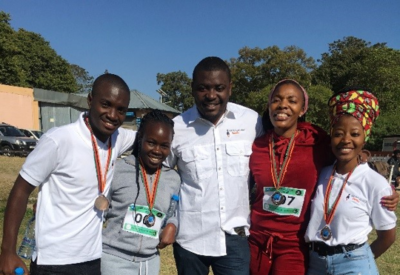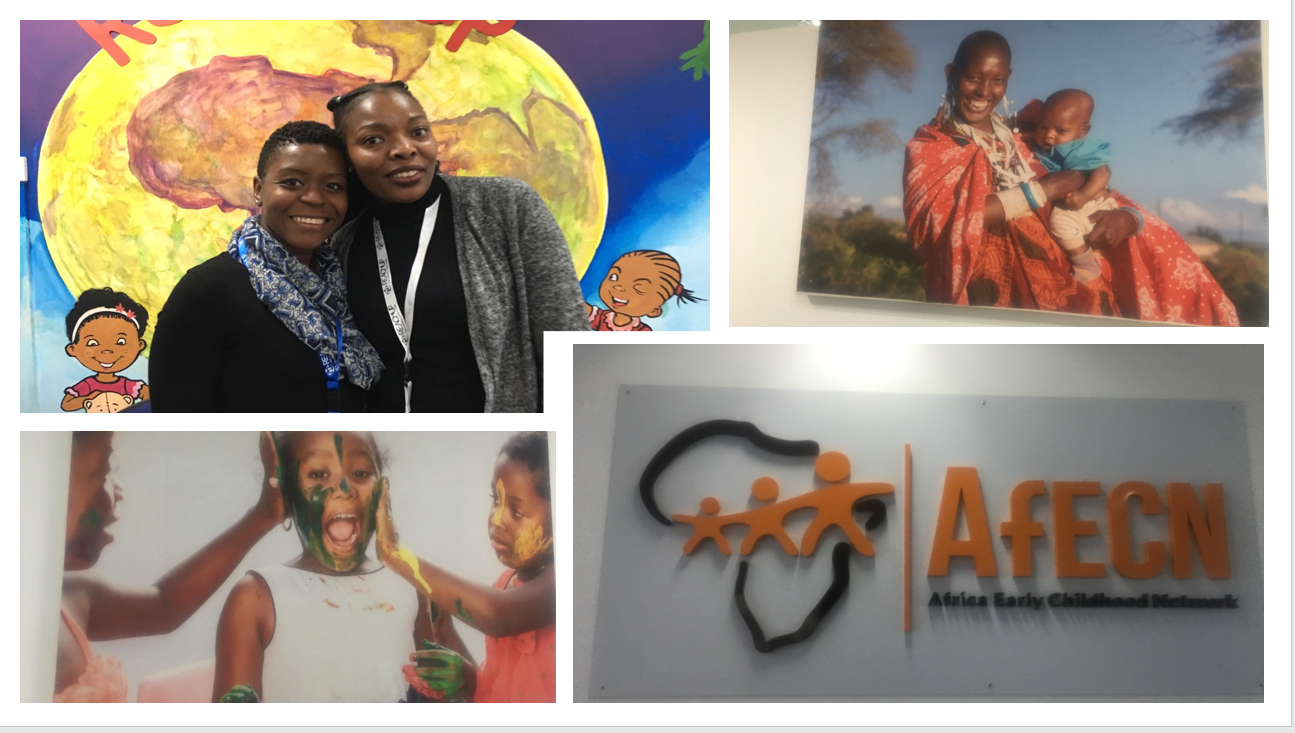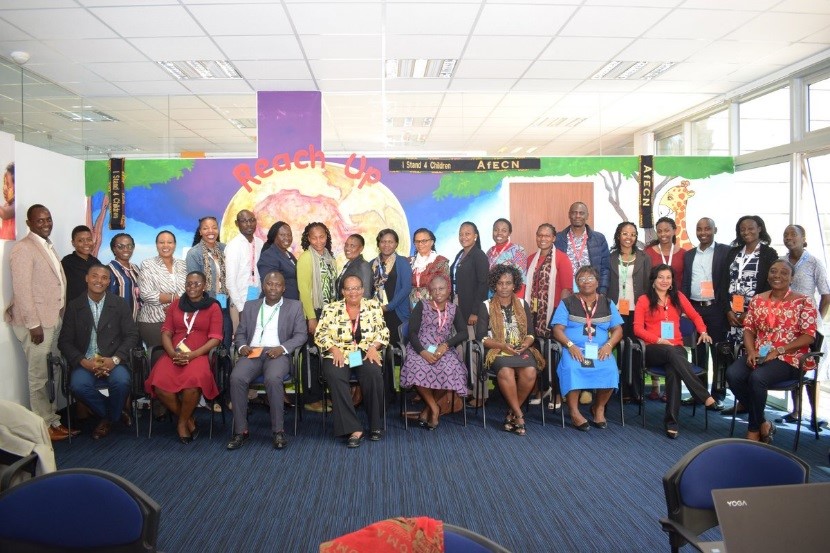Our focus in the Nutrition Programme is to place nutrition high on the agenda of governments and civil society as a key development issue. Working with civil societies, our advocacy efforts are aimed at creating greater awareness and political commitment for effective food security and nutrition. Here is what our nutrition advocates got up to in the months of June and July.
The importance of milk consumption for nutrition!

Maxwell Mumba, Young Leader in Nutrition and Nutrition Champion, Christine Muyama of GMT, Mathews Mhuru, Zambia CSO SUN, Kgomotso Seko of GMT and Esther Chungu, Zambian Gospel singer and CSO SUN Nutrition Champion
On 01 June 2019 our Nutrition Programme team visited Zambia CSO Scaling Up Nutrition Alliance (SUN) in Lusaka and took part in a World Milk Day marathon that aimed at increasing awareness on the need to increase the consumption of milk among young and adolescents if we are to prevent non-communicable diseases.
The team was excited and braved the cold at six in the morning to join the marathon which was divided into 5km walk, 5km run and 10km run, topping it up with an aerobics session. CSO SUN has partnered with the Zambia Dairy Association to raise awareness on the importance of milk, storing it properly to maintain freshness from transportation to consumption. This campaign was created to raise awareness on breastfeeding, and the intake of milk. The recommended amount for each Zambian is 500ml per day although currently it’s less than 100ml, with households sharing as little as a carton per week! School children were involved in the programme, chanting the slogan is “Milk everyday, stronger forever” and it was an honour to be part of this creative programme!
The Comprehensive Africa Agriculture Development Programme (CAADP)
With the support of our partners CARE International, the Nutrition Programme participated in the validation workshop for Zambia CAADP Biennial Review Report (BRR) to facilitate civil society input. African member states are mandated to report progress made in the Malabo commitments (targeted to be achieved by 2025) every two years. Once the BRR process is finalized and validated by all stakeholders, the report is then submitted to the Southern African Development Community (SADC).
The validation workshop, which took place on 21 June 2019 in Lusaka, Zambia, was convened by the Agricultural Consultative Forum (ACF). It was important for CSOs to be represented and their input taken into account so that it is not merely the government reporting on themselves. It was a successful and engaging validation process, with participants from Ministry of Agriculture, Ministry of Fisheries and Livestock, Ministry of Finance, Women Farmers groups and the University of Dar es Salaam, all working toward a successful submission.
Reach Up Regional Training

On 01 July 2019, the Nutrition team participated in a training in Nairobi, Kenya. The training was presented by Dr. Powell who shared findings from a research, which was made possible and worked on through the University of the West Indies. The research was based on the effects of extreme malnutrition and stunting on children from 0-3 years, to 14 years and 22-30 years old. There were four groups of children in the sample, 32 or 33 in each cohort;
- 32 children not malnourished
- 33 malnourished who received intervention through nutrient supplements only
- 32 malnourished who received intervention through supplements and stimulation (touch, play, cuddling close to chest etc.)
- 33 children malnourished who received no intervention or treatment.

Structured and well laid out training programme, participants were from six countries; Kenya, Liberia, Mozambique, Senegal, Tanzania and Zimbabwe
The scientific evidence was astounding, and there is long term funding committed to follow this group of children to adulthood and track their education choices, participation in the economy, income level, violent behaviour and their offspring! Most of them, in their mid to early twenties, surprisingly had either not procreated yet or have one child.
This research is vital to illustrate scientific evidence on the effects of stunting and why this must be prevented in the first thousand days of conception!
Read more on our Nutrition Programme here.










 The Trust supports and mobilises civil society networks on issues of ending child marriage, ending violence against children, ending female genital mutilation and promoting children’s rights, to carry out advocacy and action across Africa. Special focus is placed on Malawi, Mozambique, Tanzania and Zambia where child marriage continues to be a problem largely driven by poverty, gender inequality, harmful traditional practices, conflict, low levels of literacy, limited opportunities for girls and weak or non-existent protective and preventive legal frameworks.
The Trust supports and mobilises civil society networks on issues of ending child marriage, ending violence against children, ending female genital mutilation and promoting children’s rights, to carry out advocacy and action across Africa. Special focus is placed on Malawi, Mozambique, Tanzania and Zambia where child marriage continues to be a problem largely driven by poverty, gender inequality, harmful traditional practices, conflict, low levels of literacy, limited opportunities for girls and weak or non-existent protective and preventive legal frameworks.




 Education is a fundamental right for all children, which is also a vehicle for social, economic and political transformation in communities, countries and the African continent at large. Recent studies indicate a lack of progress in some of the critical commitments aimed at improving education quality, access, retention and achievement, particularly for girls. In most African countries, girls may face barriers to learning, especially when they reach post-primary levels of education. By implementing multi-dimensional approaches to education which includes core education, personal development, life skills and economic competencies, the Trust partners with funding partners, governments, civil societies and the private sector to improve education access.
Education is a fundamental right for all children, which is also a vehicle for social, economic and political transformation in communities, countries and the African continent at large. Recent studies indicate a lack of progress in some of the critical commitments aimed at improving education quality, access, retention and achievement, particularly for girls. In most African countries, girls may face barriers to learning, especially when they reach post-primary levels of education. By implementing multi-dimensional approaches to education which includes core education, personal development, life skills and economic competencies, the Trust partners with funding partners, governments, civil societies and the private sector to improve education access.

 The Nutrition and Reproductive, Maternal, New-born, Child and Adolescent Health and Nutrition, (RMNCAH+N) of the Children’s Rights and Development Programme aims at promoting the Global Strategy for women, children and adolescents’ health within the Sustainable Development Goals (SDG) agenda. The strategy emphasises on the importance of effective country leadership as a common factor across countries making progress in improving the health of women, children and adolescents.
The Nutrition and Reproductive, Maternal, New-born, Child and Adolescent Health and Nutrition, (RMNCAH+N) of the Children’s Rights and Development Programme aims at promoting the Global Strategy for women, children and adolescents’ health within the Sustainable Development Goals (SDG) agenda. The strategy emphasises on the importance of effective country leadership as a common factor across countries making progress in improving the health of women, children and adolescents. Through its Early Childhood Development (ECD) plan, The Trust will seek to put into action the new science and evidence Report that was presented by Lancet Series on Good and early development – the right of every child. This will be achieved by mobilising like-minded partners to contribute in the new science and evidence to reach all young children with ECD. The Trust’s goal is to be a catalyst for doing things differently, in particular, to rid fragmentation and lack of coordination across ECD sectors. In response to evidence showing the importance of political will in turning the tide against the current poor access and quality of ECD. Even before conception, starting with a mother’s health and social economic conditions, the early years of a child’s life form a fundamental foundation that determines whether a child will survive and thrive optimally.
Through its Early Childhood Development (ECD) plan, The Trust will seek to put into action the new science and evidence Report that was presented by Lancet Series on Good and early development – the right of every child. This will be achieved by mobilising like-minded partners to contribute in the new science and evidence to reach all young children with ECD. The Trust’s goal is to be a catalyst for doing things differently, in particular, to rid fragmentation and lack of coordination across ECD sectors. In response to evidence showing the importance of political will in turning the tide against the current poor access and quality of ECD. Even before conception, starting with a mother’s health and social economic conditions, the early years of a child’s life form a fundamental foundation that determines whether a child will survive and thrive optimally.